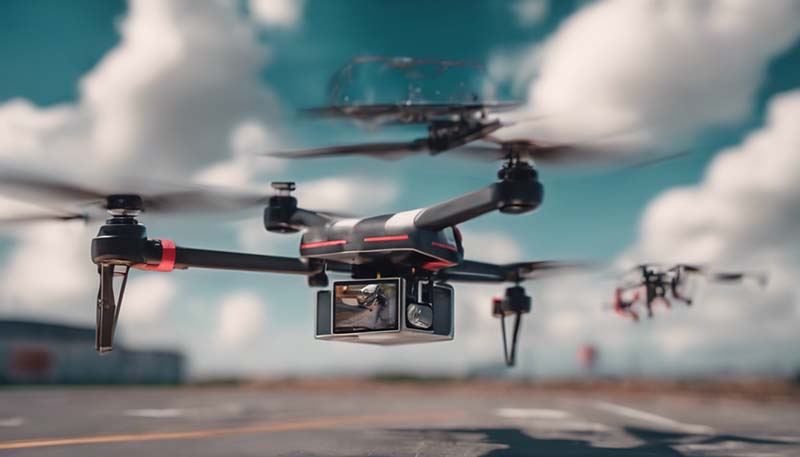The rapid advancements in technology have significantly impacted various industries, and the air cargo sector is no exception. As the world becomes increasingly interconnected, the demand for efficient and cost-effective air cargo services has never been higher. In response, the future of air cargo is being shaped by two groundbreaking technologies: drone delivery and automated logistics. This article will explore the potential of these technologies and their implications for the future of air cargo.
Drone Delivery
Drones, or unmanned aerial vehicles (UAVs), have been making headlines in recent years for their potential applications in various fields, including air cargo delivery. Drone delivery systems have the potential to revolutionize the way goods are transported, offering faster, more cost-effective, and environmentally friendly alternatives to traditional air cargo methods.
One of the primary advantages of drone delivery is its speed. Drones can bypass congested roads and other transportation infrastructure, allowing for faster delivery times. This is particularly beneficial for time-sensitive shipments, such as medical supplies or perishable goods. Moreover, drones can operate in a range of weather conditions and have lower operational costs compared to traditional air cargo methods.
Advertisement
Another significant advantage of drone delivery is its environmental impact. Drones are electric-powered and produce significantly fewer greenhouse gas emissions than traditional air cargo methods. As the world moves towards more sustainable solutions, drone delivery systems can play a crucial role in reducing the carbon footprint of the air cargo industry.
Despite the numerous benefits, there are still challenges to overcome before widespread adoption of drone delivery systems. Regulatory frameworks need to be developed to ensure the safe operation of drones, particularly in congested urban areas. Additionally, there are concerns about privacy and security, as well as the need for infrastructure development to support drone operations.
Automated Logistics
The second major technology shaping the future of air cargo is automated logistics. This involves the use of advanced robotics, artificial intelligence (AI), and data analytics to streamline and optimize the entire supply chain process, from manufacturing to delivery.
Automated logistics can significantly improve the efficiency of air cargo operations by reducing human error, increasing throughput, and optimizing resource allocation. AI-powered systems can predict demand, optimize routes, and automate inventory management, leading to cost savings and improved customer satisfaction.
One of the most significant benefits of automated logistics is its potential to create a more resilient and adaptable air cargo industry. By leveraging real-time data and predictive analytics, automated logistics systems can quickly respond to disruptions and changes in market demand, ensuring that goods are delivered on time and in the most cost-effective manner possible.
However, the implementation of automated logistics systems also presents challenges. The initial investment in technology and infrastructure can be substantial, and there may be resistance from workers who fear job displacement. Additionally, there is a need for collaboration between industry stakeholders to develop standardized protocols and data-sharing mechanisms to ensure the seamless integration of automated logistics systems.
Integration of Drone Delivery and Automated Logistics
The combination of drone delivery and automated logistics has the potential to create a truly transformative air cargo system. By integrating these technologies, the industry can achieve unprecedented levels of efficiency, speed, and sustainability.
For instance, an automated logistics system can coordinate drone delivery routes and manage inventory levels in real-time, ensuring that goods are transported quickly and efficiently. Drones can then be used to transport goods from distribution centers to customers, reducing the need for traditional transportation methods and further minimizing environmental impact.

Furthermore, the integration of these technologies can lead to the development of new business models and revenue streams within the air cargo industry. For example, companies could offer same-day delivery services or create on-demand delivery networks, catering to the evolving needs of consumers and businesses alike.
To fully realize the potential of this integration, it is essential for industry stakeholders to collaborate and invest in research and development. This includes developing the necessary infrastructure, regulatory frameworks, and training programs to support the adoption of drone delivery and automated logistics systems.
Challenges and Opportunities
While the future of air cargo looks promising with the integration of drone delivery and automated logistics, there are several challenges that need to be addressed to ensure the successful implementation of these technologies.
Regulatory frameworks must be developed to address safety concerns, privacy issues, and the potential impact on employment. Governments, industry organizations, and technology companies must work together to create a balanced approach that promotes innovation while protecting public interests.
Additionally, the initial investment required for the development and implementation of drone delivery and automated logistics systems can be substantial. This may be a barrier for smaller companies, which could lead to increased consolidation within the industry. However, partnerships and collaborations between industry stakeholders can help to mitigate these challenges and promote a more inclusive and diverse air cargo sector.
Finally, there is a need for ongoing research and development to continually improve the efficiency, safety, and sustainability of drone delivery and automated logistics systems. This includes exploring new materials, energy sources, and AI algorithms to enhance the performance of these technologies.
In conclusion, the future of air cargo is poised to undergo significant transformation as a result of drone delivery and automated logistics technologies. By addressing the challenges and embracing the opportunities presented by these innovations, the industry can create a more efficient, sustainable, and customer-centric air cargo system that meets the evolving needs of the global market.